Ways to determine an infants caloric needs

Learn how to determine your baby’s caloric needs, including the calories in breast milk and formula, to ensure your infant gets the right nutrition for healthy growth.
When children can walk, how to help babies learn to walk… are always the topics that many parents care about. If your child is learning to walk, please refer to this article.
Do you feel so happy watching your toddler take his first steps and thinking of the day when you can hold hands and take them for a walk in the park? However, it is not an easy exercise to practice, but goes through many stages. Walking is a life skill and like any other skill, it requires a lot of help from parents. At 1 year of age, babies begin to practice small steps with the help of their parents. By 18 months, the baby can walk on its own without any more support. Babies can reach this milestone when they go through many stages.
Below is a series of actions that will lead your baby to take his first steps:
6 months: Before they can walk, they must be able to stand and this is the time when they can place the focus of their body on their legs. Your baby is still not standing, so you need to support your baby.
9 months - 12 months: Once a baby is able to stand, he or she will learn to raise her body to stand up on her own. This is also the time when your baby can stand alone by holding on to something. Baby begins to take small steps by holding on to the surrounding objects. This situation will get better when the baby is 12 months old.
13 - 17 months: In the intermediate stage, the baby will fall, learn to stand up and walk by himself.
18 months: Baby is able to walk by itself without having to support or hold on furniture. In addition, your baby can also travel longer distances and almost master this skill.
Let your baby practice many times, encouraging him to do things that you can do to help him walk better.
Learning to walk through everyday play activities will help your baby walk faster.
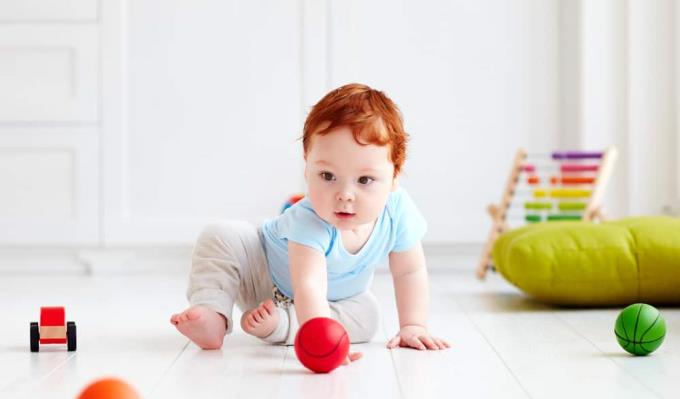
Age: babies from 6 months and older
How to play: Help your baby get up, then ask someone else to raise the toy they like a little higher so they have to raise their head. Help your baby jump to reach for the toy.
Benefits: Develops muscles and joints to maintain body weight.
Age: babies from 8 months and older
How to play: play music that your baby likes, then help him get up. Hold your baby's hand and help him move his or her body to the music. When you hold the baby's hand, the baby's feet will bear the full weight of their body. The movement will change the body's center of gravity, helping your baby to balance better.
Benefits: Help your baby learn to maintain balance, develop calves.
Age: children from 11 months or older
How to play: spread a foam sponge on the floor, place furniture to hold, then let your baby stand on the sponge. Your baby will feel the magic of this bubble sponge. When the baby walks, the balloon at the bottom of the foot will call "puff tire, pop tire", making the baby excited. If your baby seems confused and doesn't know how to do it, model it for your baby.
Benefits: helps children practice to perfect their walking skills.
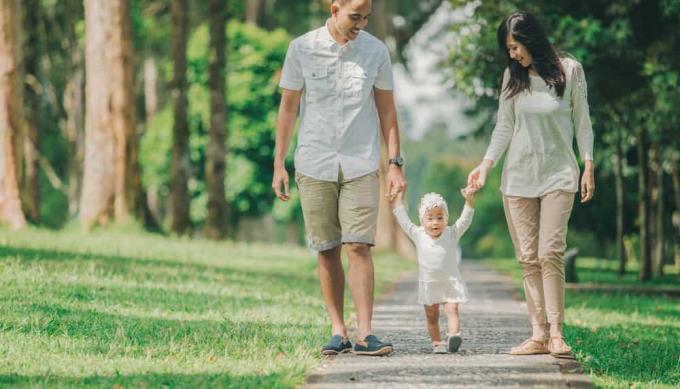
Age: children from 12 months and older
How to play: Take your baby to the park or the beach. The father and mother each took one of the baby's hands and practiced walking. If you feel that your baby wants to let go of his hand, do what he wants but walk behind him. This will be a very happy moment when you see your baby grow.
Benefits: help children learn to walk, tighten family affection.
Some babies will walk quite slowly. Here are 4 causes of this condition that you should know:
Don't panic if your baby is still older than 18 months old. This is not a problem to worry about because your baby will easily catch it up soon after.
Babies born prematurely often walk quite late. If full term babies will walk alone at 12 months, preterm babies need up to 15 months. Premature babies often reach growth milestones quite slowly. Take your baby to the doctor regularly to make sure the baby is growing normally and healthy.
Newborn infections can slow your baby to walk. Previously acquired infectious diseases can also be the cause of the baby's developmental delay. Bronchopulmonary disease, for example, also affects your baby's physical development. Therefore, you need to take your baby to the pediatrician for an examination after each time he is seriously ill.
Some genetic disorders can also cause a baby's development delay such as Down syndrome , autism, cerebral palsy ... To determine if your baby has these diseases or not, you should bring your baby to the doctor.
Babies learn to walk when they have learned to stand. However, before that she learned to crawl. Cows are the foundation for babies to stand up and walk. So, you should encourage your baby to crawl to develop leg muscles.
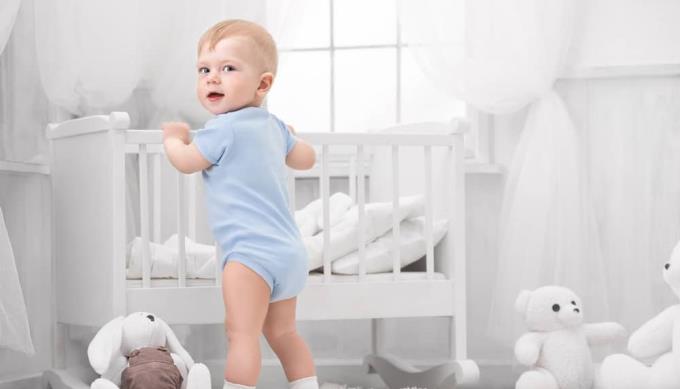
When your baby is 6 months old, take a few minutes a day to keep your baby up. This will help your baby get used to standing and learn how to focus his body on his legs. The weight of the body will stimulate the growth of the leg muscles.
There are a number of toys specifically designed to help your baby get up. Buy some items and place them near your baby while they are playing ..
When the baby begins to walk by itself by clinging to the surrounding furniture, you should arrange the most convenient objects to hold on. Pay attention to the baby and let him walk alone.
When the baby can walk on its own, you should not try to support him. Instead, act as a guardian. This way, the baby will learn how to balance body on their own feet. This not only requires movement of the legs, but also requires the combination of the brain and ears.
Never leave a baby alone even if he is 18 months old and begins to walk on his own. If you and your baby are learning to walk outdoors then you need to be extra careful. Baby can fall at any time. So, you should always keep an eye on your baby.
When your baby is just starting to walk, you should let him practice on soft surfaces such as carpets, mattresses ... This will help reduce stress on your baby's feet. If there is a fall, the baby will not hurt. As your baby gets better, you can switch to other, harder surfaces.
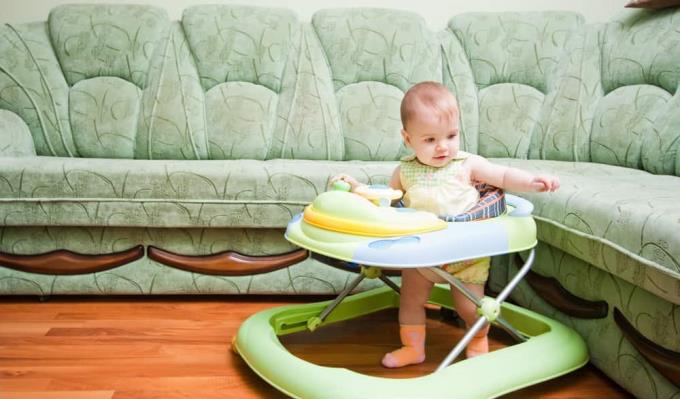
Walkers are not good for babies. Instead, you should use fixed frames, without wheels to help your baby learn to walk. A toy stroller is also very helpful in helping your baby learn to walk. However, you should make sure that there is always a fence around the car to hold your baby.
When at home, let your baby walk barefoot as this helps him feel the texture of the floor. In addition, babies also need to have free movements without being tied to shoes. However, when going out, you must put your baby on shoes to protect his feet. When choosing shoes for your baby, you should choose shoes that are lightweight, flexible and have an inner cushion. Outside, shoes should be designed to be non-slip. Baby feet usually develop at a very rapid rate, which means they will need a new pair of shoes after a few months. Check that your baby's shoes and feet fit together to see when to change shoes.
Walking is an important milestone that your baby needs to achieve at the right time. However, do not be too impatient to lead to phase burning actions. This will affect the baby's development. Let your baby develop naturally, when you see your baby enjoy walking, it is time to teach your baby the first steps.
When your baby starts to walk, you should remove dangerous objects from around the house. Wrap the sharp edges of furniture with duct tape. Make sure there is a safe environment for your baby to walk.
Experts recommend that parents should not use a baby walker . Although this helps your baby to walk more easily, it prevents muscles in the thighs from developing. Instead, parents should use their hands to help the baby step by step to help the baby's muscle and bone development.
When they can walk alone, they will begin to master themselves to move faster:
At 14 months, your baby can stand alone. The baby has been able to squat down and then stand up, maybe even go back.
By the time the baby is 15 months old, walking has become more proficient. Babies can play push and pull games while walking. At this age, the baby's steps are quite far apart and feet are facing outward. This is normal to help your baby balance.
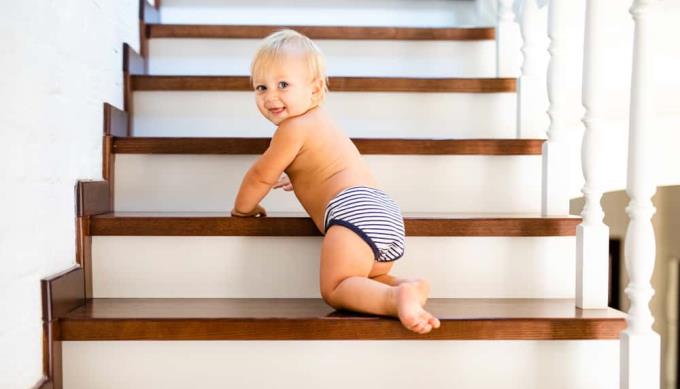
Your baby will begin to enjoy going up and down stairs even though it still needs your help.
I will go proficient at 18 months old. Babies love to climb up furniture, including stairs, although they still need help climbing over the next few months. Your baby may try to kick a ball, although it may not always be successful and he will love to dance while listening to music.
At 25 or 26 months, your steps will be stronger. Baby will control heels and toes while walking like a tiptoe. So running and jumping also becomes easier.
Your toddler will be a memorable stage in your parenting process. Hopefully, with the above suggestions, you will have beautiful memories with your baby!
Here are some signs that you should be aware of in order to treat them promptly:
6 months: unable to sit up straight, unable to bear the gravity of the body with two legs even with support.
9 months: Can not stand even though he has held himself on furniture and can not lift himself to stand up.
12 months: Unable to walk on her own even after clinging to the furniture.
18 months: Can't walk on her own without the support of furniture and parents.
If your baby has any of the above signs, take him to the doctor. This means your baby will have to spend more time learning to walk. Fun activities are all that your baby needs to master walking skills. Once your baby is able to walk on its own, you and your baby will have many beautiful moments to enjoy together.
Learn how to determine your baby’s caloric needs, including the calories in breast milk and formula, to ensure your infant gets the right nutrition for healthy growth.
Discover the top 5 smartest dog breeds in the world, including Border Collie, Poodle, German Shepherd, Golden Retriever, and Doberman Pinscher. Learn about their unique traits and why they are considered the most intelligent dogs.
Discover 7 nutritious and delicious ways to cook egg porridge for babies, including recipes with cheese, pumpkin, tomato, and more. Learn how to prepare baby-friendly egg porridge with our expert tips.
After a series of medical measures they obtained a complete human vascular system profile.
Watermelon is one of the fruits that many people love, not only cheap but also delicious, nutritious and refreshing in the summer. To get delicious watermelon pieces, show off your housewives, your artistic talents to cut beautiful pieces of watermelon.
aFamilyToday Health - The digestive system and body in each baby is different. Parents need to recognize notes to deal with when babies have a food allergy!
Babies need many factors for perfect development. aFamilyToday Health shares with parents things to keep in mind when babies are 8 weeks old so that parents can take care of their babies the best!
Babies need many factors for perfect development. aFamilyToday Health shares with parents things to keep in mind when babies are 18 weeks so that parents can take care of their babies the best!
Babies need many factors for perfect development. aFamilyToday Health shares with parents things to keep in mind when babies are 28 weeks old so that parents can take care of their babies the best!
Babies need many factors for perfect development. aFamilyToday Health shares with parents things to keep in mind when babies are 32 weeks old so that parents can take care of their babies the best!








